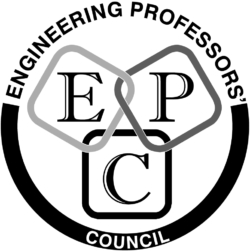
The instigator of these annual get-togethers was Professor Giffen of Queen Mary College, at that time Dean of the University of London Faculty of Engineering. For the next two decades the organisation centered on the office of Dean, with administrative support being provided by the Secretary of the board of the Faculty. At first the meetings were held in London but in 1959 the professors assembled in Bristol and for some time thereafter the venue alternated between London and other universities throughout the country. From the early 1970’s the annual conference moved from one university to another and the organisation carried out by a local Convener with the help of the Committee. The proposal to establish a formal organisation was first put to the conference in 1970. It outlined an organisation with “elected officers and an executive committee, which would have powers to establish working parties, to give evidence and to establish, through consultation, statements on policy”. It was argued that, if policies could be formulated which would have the general support of the professoriate, they would carry more weight with outside bodies than would the views of individuals. In 1974 a constitution was approved and the task of establishing the EPC as speaking for the engineering professoriate began. In 1979 the EPC Research Unit was set up, with the appointment of Dr Jack Blears as Honorary Research Officer. Its aim was to ensure that the up-to-date factual information was available to provide the basis for EPC proposals. In the following decade, the Committee and its Working Parties produced policy documents, such as ‘Statement on the Education & Training of Engineers’ and ‘Engineering Research in Universities’, gave evidence and responded to the report of the Finniston Inquiry amongst others and considered issues ranging from pre-university education and entrance requirements, the structure and content of university undergraduate courses, accreditation and EA1/2 to the problems of industrial training and of resources. The EPC Occasional Papers series was established to enable the results of some of these deliberations to reach a wider audience. Over this period the Chairmen and Committee worked hard to establish influential contacts. The Committee for Engineering in Polytechnics (CEP) was formally established in 1981 to speak and act on behalf of all the polytechnic engineering departments, and to represent those interests to government and other relevant bodies. In this way its activities mirrored those of the EPC in the university sector and it rapidly established itself as the voice for engineering in the public sector of higher education. The parent bodies of CEP at the time of its formation were four existing Standing Conferences of Polytechnic Heads of Department in civil engineering, electrical and electronic engineering, mechanical and production engineering and process and materials engineering. The Committee consisted of elected representatives from each of the Standing Conferences, which together covered 144 academic departments in 42 polytechnics and colleges. CEP established a successful annual conference in November of each year, to which all members of the Standing Conferences were invited. The Standing Conferences also maintained their own programmes of activities since they had clearly established themselves as valuable communities of interest. This proven value was subsequently recognized when the Standing Conferences were re-constituted as Sectoral Groups of the present EPC. Please note that the formerly titled ‘Sectoral Groups’ are now known as ‘Discipline-based communities‘.
The Engineering Professors’ Conference had its origins in an association set up in the early 1950s, with the primary purpose of organising an annual meeting at which university professors of engineering could take part in an informal exchange of ideas about engineering education, research and other matters of common interest.